Help! My Diamond’s Chipped… How Can I Fix It?
Wait a minute… Isn’t diamond the hardest material on Earth? If they are so hard, how can they be damaged or chipped? Here’s a common misconception people have. They think that diamonds are indestructible and cannot be broken.
From a scientific perspective, the hardness of a material actually relates to its ability to resist deformation (e.g. scratches). While a diamond may be hard, it isn’t a tough substance. In fact, its ability to resist fractures is pretty weak! And yes, diamonds can chip and they frequently do so…
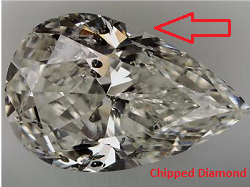
Severe Chipping on Girdle
One of the most common causes of chipping is to knock your ring against a hard object when it is worn. For example, by accidentally hitting your ring against a metal shelf during grocery shopping, you could cause the diamond to be chipped if the force is correctly applied along its cleavage plane.
How to Avoid Damaging Your Diamond Jewelry?
To protect your precious jewelry from getting damaged, you need to apply some common sense and take note of certain precautions when wearing them. For example, you should remove jewelry from your hands when performing strenuous activities like gardening or exercising.
Also, when selecting a diamond, you want to avoid those with “extremely thin” or “very thin” girdles. The thickness of the girdle plays a critical role in the diamond’s vulnerability to external damage because it provides mechanical strength to the crystalline structure.
What Are My Options If My Diamond is Already Chipped?
Before you take corrective measures, here are some pointers to help you seek recourse and determine the actions to take.
1) What is the size and quality of your stone?
2) What is the extent of the chip?
3) What is the age and cut of the stone?
4) Does it hold sentimental value?
The size of the diamond is the biggest factor involved in decision making because it determines the final value. When repairing a chipped diamond, you need to take into account the fees and labor costs of sending it to a skilled cutter for repairs.
These costs could range from $50 to $300 depending on the degree and amount of work required. If the diamond in question is less than 0.30 carats, most of the time it doesn’t make economical sense to send it in for re-polishing.
Repairing Chips May Not Always Be The Ideal Solution
Depending on the size and depth of the damage, re-polishing can be performed on the stone to grind down a small chip. In such scenarios, an additional facet is usually created on the surface of the stone. Ideally speaking, these are the best kinds of minor repairs that will result in minimum weight loss from the stone while preserving its original value.
If the damage is severe, your best option would be filing a claim with your insurance company. Give your insurance representative a call and see if they can replace the jewelry for you.
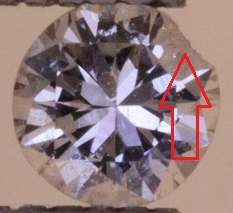
Repairing this diamond might result in significant weight loss
If the piece of jewelry holds sentimental value and you want to keep the diamond in its current condition, you could actually mount it in a setting which covers up the flaws. For example, a bezel setting provides a metal rim around the circumference of the diamond and protects it from further damage.
This could be an option to explore without having to re-cut the stone and helps prevent further damage from propagating. Likewise, you could also take the chipped diamond and use it in other forms of jewelry where flaws will not be easily noticed. For example, you could mount it into a pendant or turn it into a set of earrings with another diamond.
As always, it is wise to consult with your jeweler first and seek a professional opinion before deciding on the course of actions to take.
Related Articles
Leave A Comment




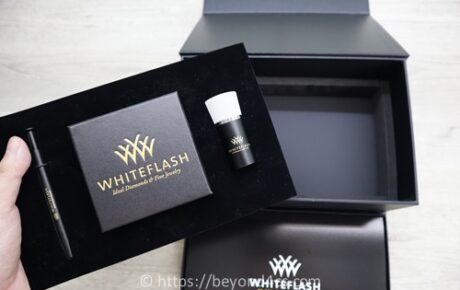




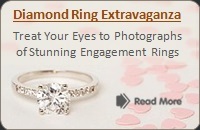
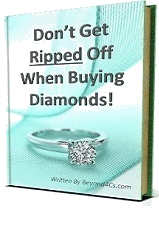

2 Comments
Just realized my wife’s princess cut engagement got chipped when we brought it in for a upgrade discussion with another jeweler. The new jeweler mentioned that this diamond was chipped during the setting process and show me the damage with their microscope.
It’s been 5 years since I bought that ring and I don’t think that it would be possible to get the first jeweler to take responsibility now. What should I do?
Hi William,
I am sorry that you found out about the damaged ring. It is definitely an experience that people don’t want to go through. My advice for you is to take the ring back to the first jeweler and see what they have to say about it.
The next best advice would be to approach your insurance company and file a claim.
Hope this helps.
Paul